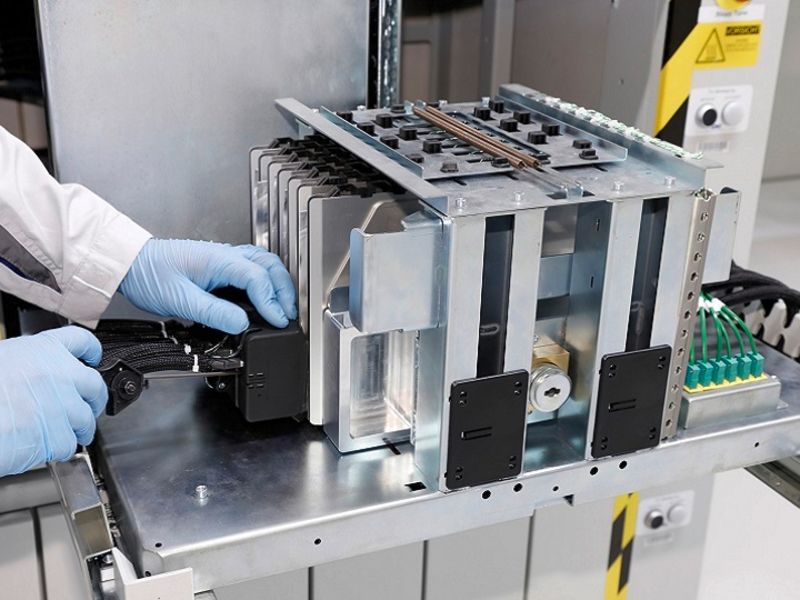FRANKFURT — Volkswagen Group plans to have six battery cell production plants in Europe to secure supply for its electric vehicle push.
The plants will have a production capacity of 240 gigawatt hours per year, VW said during its Power Day on Monday.
“Together with partners, we want to have a total of six cell factories up and running in Europe by 2030, thus guaranteeing security of supply,” VW’s technology and procurement chief, Thomas Schmall, said in a statement.
VW said it will build the factories alone or with partners.
The first two factories will operate in Skelleftea, Sweden starting in 2023, and in Salzgitter, Germany, starting in 2025.
The third will be in France, Spain or Portugal and would open by 2026, Schmall said. Poland, Slovakia and the Czech Republic were possible locations for the fourth factory in 2027. “It depends on where we get the best set-up in the region,” Schmall said.
The Swedish factory, built with battery startup Northvolt, will expand its capacity to 40 gigawatt-hours and focus on unified premium battery calls, VW said.
VW will buy Northvolt’s share of their joint venture battery factory in Salzgitter. The factory will produce cells for the high-volume segment starting in 2025. Annual production capacity of up to 40 GWh per year is also planned for Salzgitter.
Volkswagen did not specifically say how much its plans to expand battery production will cost.
While the first two factories are already reflected in Volkswagen’s financial planning, the group is currently in “deep discussions” about how the subsequent plants fitted with financial targets, Schmall said.
He added if VW needed to increase its role in battery cell production then the group would be able to bear that cost.
The push will cost $29 billion and would make VW and its partners the world’s second-largest cell producer after China’s Contemporary Amperex Technology Co. Ltd., according to BloombergNEF.
Prismatic battery cells
VW unveiled plans to have a new unified prismatic battery cell from 2023, which will support cost cuts generated by the raised level of in-house cell production and could impact its current suppliers.
Electric vehicle makers, including Tesla, are using cylindrical battery cells, which resemble flashlight batteries and are relatively inexpensive and easy to manufacture.
Prismatic cells, which resemble a thin hardcover book, are housed in a rectangular metal case and are more expensive. Pouch cells, another alternative, are thinner and lighter, and resemble a flexible metal mailing envelope.
“On average, we will drive down the cost of battery systems to significantly below 100 euros ($119) per kilowatt hour,” Schmall said. “We will use our economies of scale. This will finally make e-mobility affordable and the dominant drive technology.”
VW is also researching solid-state batteries that it says are cheaper to assemble and allow for faster charging.
Northvolt said on Monday it had received an order from VW worth more than $14 billion over 10 years. The Swedish company, founded in 2016 by former Tesla executive Peter Carlsson, aims to take on major Asian players such as CATL and LG Chem. It targets a 25 percent market share in Europe by 2030.
Fast-charging networks to grow
VW said Monday that it will also invest 400 million euros ($477 million) by 2025 to build out much-needed charging infrastructure in Europe, after the region overtook China in EV sales last year. Fast-charging in Europe will grow fivefold to 18,000 stations, helped by cooperations with BP in the UK, Iberdrola and Spain and Enel in Italy as well as VW’s existing Ionity consortium.
In North America, VW is adding 3,500 stations for this year and 17,000 points in China by 2025. Cooperations on charging as well as strategic partnerships on batteries will help VW safeguard financial targets including a 6 percent capital investment ratio by 2025 and an adjusted annual net cash flow of more than 10 billion euros, the carmaker said.
A lack of infrastructure is still seen as a major hurdle to the mass adoption of battery-powered cars.
VW plans to make 26 million fully electric cars by 2030, highlighting concerns over battery cell costs, capacity constraints as well as raw material shortages. The automaker said earlier this month that it wants full-electric vehicles are expected to account for more than 70 percent of VW brand’s European vehicle sales by 2030 and more than 50 percent in the U.S. and China, as part of its ‘Accelerate’ strategy.
As carmakers scale up EV offerings, Tesla and other new entrants like Nio are stepping up their plans. Tesla expects to add a battery-cell factory to the car-assembly plant under construction near Berlin. The site will initially have a capacity of more than 100 gigawatt-hours a year and eventually ramp up to as much as 250 gigawatt-hours, CEO Elon Musk said during a battery conference in November.
Reuters and Bloomberg contributed to this report.
